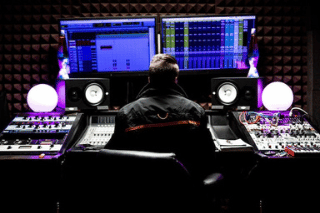Top Tech Innovations in Music: How Technology is Changing the Musical Landscape
Music has been an integral part of human civilization since the beginning of time. It has evolved over the years, and with the advancement of technology, the music industry has undergone a significant transformation. Technology has played a crucial role in shaping the way music is created, distributed, and consumed. In this article, we will explore how technology has changed the musical landscape and the top tech innovations that have revolutionized the music industry.
The Evolution of Music Technology
The music industry has come a long way since the invention of the phonograph in 1877. The phonograph was the first device that could record and playback sound. It was followed by the gramophone, which used a flat disc instead of a cylinder. The introduction of the radio in the early 1900s made it possible for people to listen to music from the comfort of their homes. In the 1960s, cassette tape was introduced, which made it possible for people to record music and create their mixtapes.
The 1980s saw the introduction of the compact disc (CD), which revolutionized the way music was distributed. The CD was smaller, more durable, and had better sound quality than the vinyl record. In the late 1990s, digital music started gaining popularity with the introduction of the MP3 format. This made it possible for people to download and share music online.
The Top Tech Innovations in Music
In the ever-evolving world of music, technological advancements have wielded a transformative influence, reshaping how music is created, experienced, and shared. This section delves into some of the foremost technological innovations that have propelled the music industry into uncharted territories, enriching the creative process, altering soundscapes, and revolutionizing the ways in which audiences engage with musical artistry.
Digital Audio Workstations (DAWs)
Digital Audio Workstations (DAWs) are software programs that allow producers to record, edit, and mix music on a computer. DAWs have revolutionized the music industry by making it possible for anyone with a computer to create professional-sounding music. Some popular DAWs include Ableton Live, Logic Pro X, and Pro Tools.
Auto-Tune
Auto-Tune is a pitch correction software that was first introduced in the late 1990s. It has since become a ubiquitous tool in the music industry, used to correct pitch errors and create the signature robotic effect heard in many pop songs. Auto-Tune has been criticized for its overuse, but there’s no denying its impact on the industry.
Streaming Services
Streaming services like Spotify, Apple Music, and Tidal have changed the way people consume music. Instead of buying physical copies of albums, people can now access millions of songs on their phones or computers. Streaming services have also made it possible for independent artists to reach a wider audience without the backing of a major record label.
Social Media
Social media has made it easier for artists to connect with their fans and promote their music. Platforms like Instagram, Twitter, and TikTok have become powerful marketing tools for musicians. Social media has also made it possible for fans to discover new artists and connect with other fans.
Virtual Reality (VR) and Augmented Reality (AR)
Virtual Reality (VR) and Augmented Reality (AR) have the potential to revolutionize the way people experience music. VR and AR can be used to create immersive music videos and live performances. They can also be used to create interactive music experiences where fans can interact with the music in new ways.
Career and Education
The music industry is constantly evolving, and aspiring music professionals need to stay up-to-date with the latest trends and technologies. There are many career paths in the music industry, including music production, artist management, marketing, and more. Pursuing a degree in music business or music production can be a great way to gain the skills and knowledge needed to succeed in the industry.
Key Takeaways
Technology has played a crucial role in shaping the music industry, from the invention of the phonograph to the introduction of streaming services. Digital Audio Workstations (DAWs), Auto-Tune, streaming services, social media, and Virtual Reality (VR) and Augmented Reality (AR) are some of the top tech innovations that have revolutionized the industry. If you’re interested in pursuing a career in the music industry, consider taking the NYU x Billboard | Music Industry Essentials online course and certificate program to gain the skills and knowledge needed to succeed.



